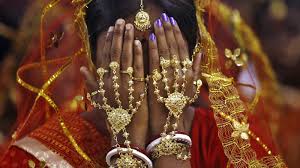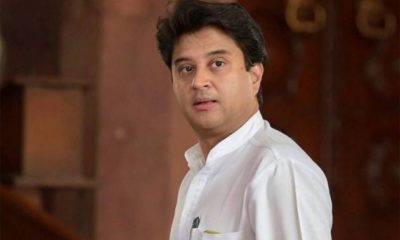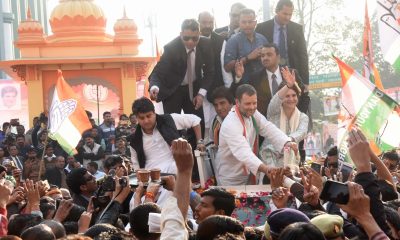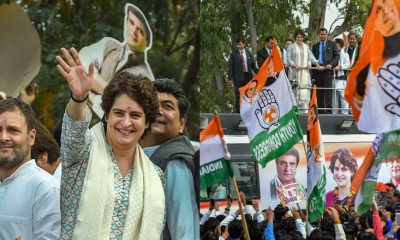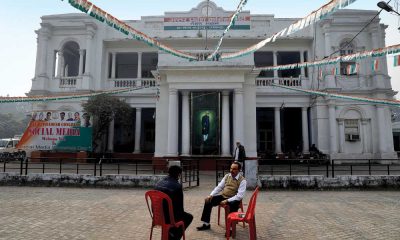Top News
2,234 get HIV via blood transfusion; government claims ignorance
 As many as 2,234 people contracted the human immunodeficiency virus (HIV) after receiving blood transfusions in hospitals between October 2014 and March 2016, according to data released by the National AIDS Control Organisation (NACO), but the government told Parliament it did not know of these infections.
As many as 2,234 people contracted the human immunodeficiency virus (HIV) after receiving blood transfusions in hospitals between October 2014 and March 2016, according to data released by the National AIDS Control Organisation (NACO), but the government told Parliament it did not know of these infections.
The information was made available by NACO when it replied to a right-to-information (RTI) request filed by activist Chetan Kothari earlier this year.
“No,” was the reply the Ministry of Health — NACO’s parent organisation — gave on August 16, 2016, to a question from Congress member of Parliament and former minister Jyotiraditya Scindia asking if the government was aware that “a large number” of people nationwide had been infected with HIV while getting blood transfusion.
“The limitations of available testing methods while screening blood units for HIV in blood banks as a result of which possibility of HIV transmission during blood transfusion cannot be completely ruled out,” the ministry said in its reply.
India fell 9 per cent short of its blood requirement in 2015-16, IndiaSpend reported September 3, with prosperity dictating availability; Bihar, for instance, was 84 per cent short of its blood requirements and Chhattisgarh 66 per cent short, while Chandigarh was over-supplied nine times and Delhi three times.
NACO disputes the reliability of the data it released, claiming that it “refers to information on self-reported transmission of HIV”, and is “not corroborated by any scientific means to confirm that transmission is indeed due to blood transfusion”.
Blood transfusion is deemed “as an acceptable way of getting infected, rather than others showing bad lifestyles”, said Zarin Bharucha, pathologist and chairperson of Federation of Bombay Blood Banks.
Only South Africa and Nigeria have more HIV patients than India, where more than two million people are infected, according to a 2015 NACO report.
Despite a 5 per cent decline in the number of patients testing positive for HIV since 2007, 86,000 new infections and 68,000 AIDS-related deaths are reported every year.
Up to 95 per cent of India’s HIV transmissions are caused by unprotected sex, according to a December 2015 answer to the Lok Sabha.
Blood transfusions account for 0.1 per cent of HIV infections, according to data released in the Lok Sabha reply, but based on NACO figures, it would account for 1.7 per cent.
Either way, the number of HIV infections through blood transfusions should be zero: the US reported its last such case in 2008, the UK 2005 and Canada 1985.
It is mandatory for hospitals to screen donors and donated blood for what are called transfusion-transmitted infections, such as HIV, hepatitis B and C, and malaria. That isn’t always done, and when it is, the chances of ruling out HIV-positive blood are not 100 per cent.
There is a window between the contraction of the virus and the production of anti-HIV antibodies in the blood that leads to the virus being undetected by tests. This period varies depending on the sensitivity and specificity of the test.
“The blood transmission mainly occurs in this period,” said Bharucha. “Most of the (blood) banks use recent testing to shorten the window period, but these tests are expensive, so they are not used in many government-run hospitals.”
Introduced in 2001, the nuclear acid amplification test has reduced the length of time HIV might be undetected to between seven and nine days, from two weeks and some months previously.
Some states lack adequate HIV-testing facilities. In Jharkhand, 17 of the 24 districts did not have test facilities, according to a 2015 India Today report.
There are an estimated 19,800 integrated counselling and testing centres (ICTCs) nationwide, an increase of 4,194 over the last three years. There should be at least one ICTC in every district, according to National AIDS Control Programme (NACP) rules.
The inconsistency in government funding for the NACP has not helped: The government slashed funding in 2014-2015 by 26 per cent compared to the previous two years, then increased it over the last two years by 31 per cent. The NACP budget for 2016-17 is still 3 per cent less than it was in 2012-2013.
The lack of testing facilities leads hospital staff to rely on what is called “pre-donation history”, an account of donations made by a donor.
“Relying on pre-donation history means if donors do not give personal history correctly, their blood is at risk,” said Bharucha.
In a country where being HIV positive is still considered a social stigma — infected people tend to hide the fact — not testing blood and donors is a gamble, as is the practice of using what are called “replacement donors”.
Hospitals short of blood often ask a patient’s family to find a donor. “Not everyone has a donor available, so they might land up getting a paid donor,” said Bharucha. Even if paid blood donations are forbidden (the Supreme Court banned them in 1996), they still take place, increasing the chances of patients getting blood that is HIV positive.
“Awareness is the key to tackle this issue,” says Bharucha. “Communities should be aware of the danger of this practice.”
(06.09.2016 – In arrangement with IndiaSpend.org, a data-driven, non-profit, public interest journalism platform. Silvio Grocchetti is a multimedia journalist and has a BA degree from Napier University, Edinburgh. The views expressed are those of IndiaSpend. Feedback at [email protected])
Top News
Dr. Abhishek Verma Dedicates a Shelter in Memory of His Mother, Veena Verma, at KGMU; Inaugurated by Daughter Nicolle Verma

World-renowned business tycoon Dr. Abhishek Verma has supported Foodman Vishal Singh’s Hunger-Free World mission. In memory of his mother, Late Veena Verma, who was a 3 term Rajya Sabha MP.
Dr. Verma dedicated a state-of-the-art free permanent shelter for the attendants of patients at KGMU Medical University, Lucknow, under the aegis of Vijay Shree Foundation. His daughter, Nicolle Verma, inaugurated the shelter.

During the event, Foodman Vishal Singh honored Nicolle Verma by presenting her with a memento. Mrs. Nidhi Sharma and Avantika Yadav, associated with the organization, welcomed her with garlands. Following this, Nicolle Verma distributed essential items to the attendants and also handed out fruits. She became emotional remembering her grandmother on her birth anniversary.
On this occasion, she also inaugurated the “Veena Verma Sevalaya” in memory of her grandmother, Veena Verma, to serve the attendants. She expressed, “I feel proud that my family is engaged in nation-building as well as social service. Today, in collaboration with Vijay Shree Foundation founder Foodman Vishal Singh Ji, I feel immensely proud to dedicate this shelter for the poor, helpless, and needy attendants of patients battling serious illnesses like cancer. I am honored to be associated with the Hunger-Free World Mission for humanity.”

Inspired by the continuous humanitarian service provided by Vijay Shree Foundation over the past 17 years, Nicolle Verma donated 10 lakh rupees to support the cause. The purpose of this donation is to ensure that services continue for the needy attendants of patients suffering from severe illnesses in hospitals, as facilitated by Foodman Vishal Singh.
It is noteworthy that Dr. Abhishek Verma’s family has a legacy of public and philanthropic service. They are helping millions to carry forward the values and service work of their parents. On the occasion of his mother’s birth anniversary, Dr. Abhishek Verma dedicated this state-of-the-art permanent shelter at Lucknow Medical College to serve the attendants of patients through the Vijay Shree Foundation.

Supporting Foodman Vishal Singh’s Hunger-Free World mission, Dr. Abhishek Verma assured that he would continually support keeping this flame of humanity alive. He also promised to assist in providing medicines to the helpless patients.
Continuing her grandmother’s legacy of service, Nicolle Verma personally served food to the needy patients and attendants. She said, “It is our good fortune to have received the joy of doing this noble work today through Foodman Vishal Singh. I have taken another step forward in carrying my family’s values and cooperation by joining hands with the Vijay Shree Foundation. My father taught me to serve and help the needy, and I feel happy when I bring a smile to someone’s face.”

On the birth anniversary of the late Veena Verma, the event organizer, Vijay Shree Foundation founder Foodman Vishal Singh, said, “We feel proud and happy that Dr. Abhishek Verma, a globally renowned business tycoon, has extended his support to uplift our country from the hunger index. Today, on his mother’s birth anniversary, he inaugurated a state-of-the-art permanent shelter at Lucknow Medical College, which will always be helpful for the needy attendants of patients. It is a pleasure for me and the organization to receive the affection of Mr. Verma.”
The event was attended by General Manager Verma Family Office Hemant Garg, Sonu Rajput, and the organization’s volunteers, including Sandeep Singh, Parmeshwar Ji, Prashant Rao Gautam, Balram Singh, Ramesh Chaudhary, Suman, Jeetu, Anil, Suraj, Vinay, Manish Bhadauria, Manas Mehrotra, Vivek, Apurv, Happy, and others.


